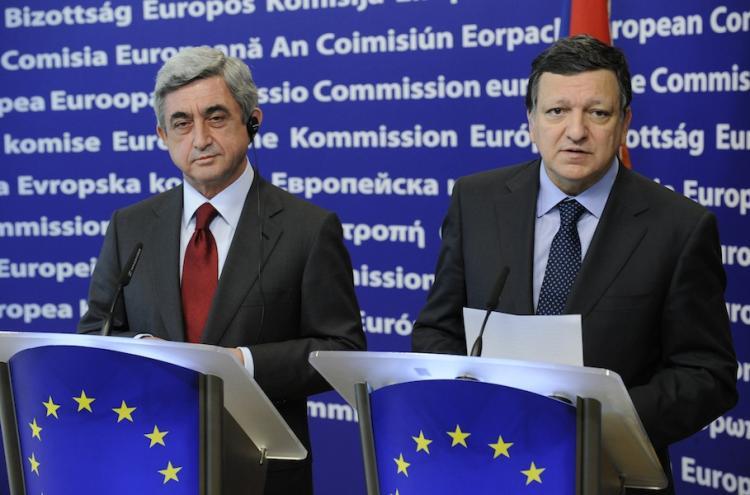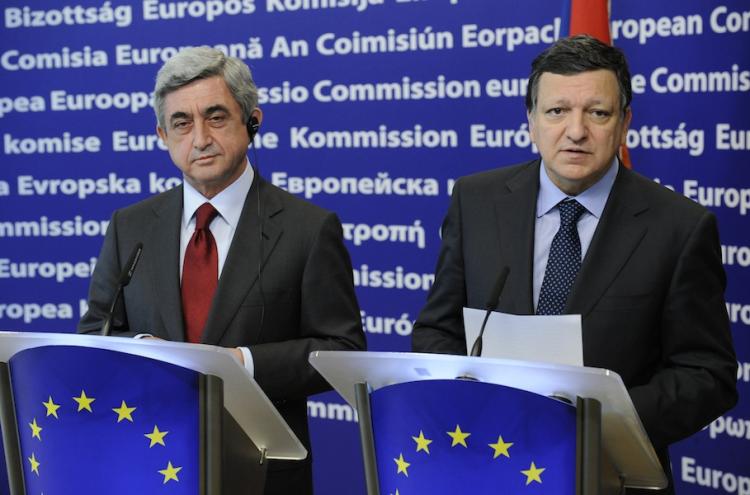Banks, lenders, and other financial institutions should be paying taxes to establish a fund for future financial crises, the European Commission (EC) recommended on Thursday.
The EC will recommend the measures at the G-20 Summit in Toronto next month. While the funds will ensure that bank failures are orderly managed to avoid a destabilization of the financial markets, they will not be used to bail out any banks.
“It is not acceptable that taxpayers should continue to bear the heavy cost of rescuing the banking sector,” said Michel Barnier, commissioner of internal markets, in an EC statement. “I believe in the ‘polluter pays’ principle. We need to build a system which ensures that the financial sector will pay the cost of banking crises in the future.”
Over the past two years, European and U.S. governments used taxpayer money to bail out major financial institutions to avoid a worldwide collapse of the financial system.
Some countries in the European Union are already considering such a plan to tax banks for future crises, as German Chancellor Angela Merkel recommended such a measure at the EU finance ministers meeting last month. But the EC was concerned that a lack of coordination among member states could lead to variation of taxes and alter the competitive landscape.
Barnier stressed that the program “is not a bailout fund,” adding that “banks should be asked to contribute to a fund designed to manage bank failure, protect financial stability, and limit contagion.”
Critics of the plan say that an EU-wide approach has pitfalls.
“Why should the banks in one country pay for the problems of banks in another? As has been seen by the Greece crisis, what is essential is that each country must take its own actions—and early,” said British Bankers’ Association (BBA) chief executive Angela Knight in a BBA statement.
The BBA is an organization of global banks and publishes the Libor, which is the agreed-upon interbank borrowing rate.
Knight said that “each country needs to put in place arrangements so that if intervention is required, then this is paid for by the industry and depositors are protected.”
The EC will recommend the measures at the G-20 Summit in Toronto next month. While the funds will ensure that bank failures are orderly managed to avoid a destabilization of the financial markets, they will not be used to bail out any banks.
“It is not acceptable that taxpayers should continue to bear the heavy cost of rescuing the banking sector,” said Michel Barnier, commissioner of internal markets, in an EC statement. “I believe in the ‘polluter pays’ principle. We need to build a system which ensures that the financial sector will pay the cost of banking crises in the future.”
Over the past two years, European and U.S. governments used taxpayer money to bail out major financial institutions to avoid a worldwide collapse of the financial system.
Some countries in the European Union are already considering such a plan to tax banks for future crises, as German Chancellor Angela Merkel recommended such a measure at the EU finance ministers meeting last month. But the EC was concerned that a lack of coordination among member states could lead to variation of taxes and alter the competitive landscape.
Barnier stressed that the program “is not a bailout fund,” adding that “banks should be asked to contribute to a fund designed to manage bank failure, protect financial stability, and limit contagion.”
Critics of the plan say that an EU-wide approach has pitfalls.
“Why should the banks in one country pay for the problems of banks in another? As has been seen by the Greece crisis, what is essential is that each country must take its own actions—and early,” said British Bankers’ Association (BBA) chief executive Angela Knight in a BBA statement.
The BBA is an organization of global banks and publishes the Libor, which is the agreed-upon interbank borrowing rate.
Knight said that “each country needs to put in place arrangements so that if intervention is required, then this is paid for by the industry and depositors are protected.”






